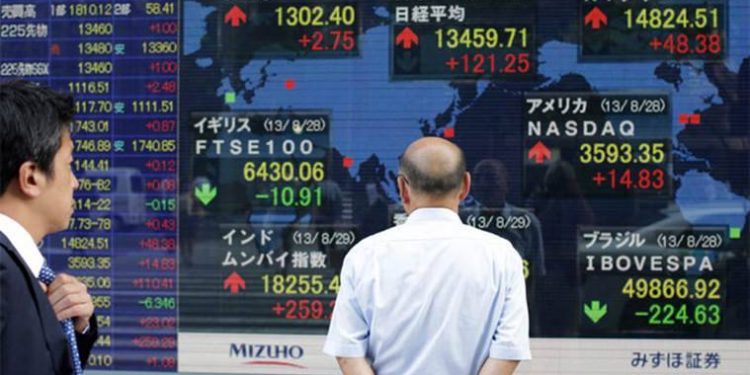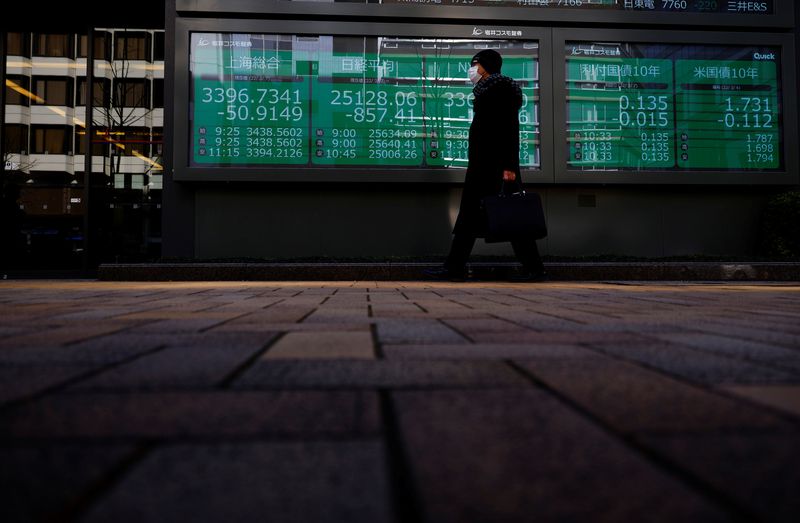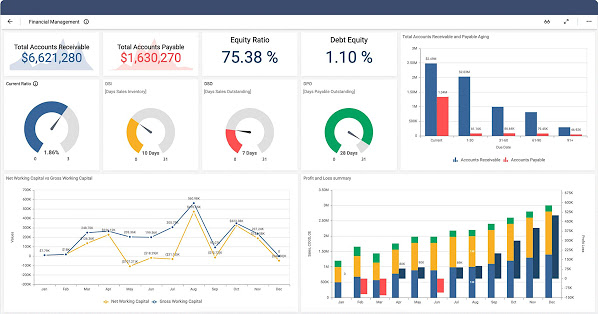Stocks and oil dive as investors hunt safe havens

By Wayne Cole SYDNEY (Reuters) – Asian markets got off to a shaky start on Monday as U.S. stock futures took an early skid on rate worries, while a tightening lockdown in Shanghai stoked concerns about global economic growth and possible recession.
- Asian stock markets :
- S&P 500 futures fall early, Nikkei futures down
- Growth fears as Beijing sticks with zero-COVID policy
- U.S. CPI looms, market priced for rapid Fed hikes
- G7 vows to phase out Russian oil, crude slips

Stocks and oil: NEW YORK (Reuters) – Stock indexes around the world fell sharply, oil prices sank about 6% and the dollar finished just off a 20-year high as investors fled risk and sought safe havens due to worries about inflation and slower global economic growth.
Oil prices tumbled as coronavirus lockdowns in China, the top oil importer, fed worries about energy demand. Gold fell and bitcoin plunged to its lowest level since July 2021.
U.S. Treasury yields eased after the benchmark 10-year note hit 3-1/2 year highs as traders braced for consumer price data and the auction of $103 billion in U.S. government debt this week.
U.S. stocks extended Friday’s bruising sell-off as investors rushed to protect themselves against the prospect of a weakening economy.
“With slowing growth, regardless of a recession or not, you’re going to see multiple compression for anything that’s growth related. It’s not necessarily an indictment of their fundamentals. It’s an indictment of their multiples,” said Michael James, managing director of equity trading at Wedbush Securities in Los Angeles.
“Investors are far more concerned with capital preservation at this point, and you’re more concerned with raising cash in the event the macro environment worsens.”

Stocks and oil
Central banks in the United States, Britain and Australia raised interest rates last week, and investors girded for more tightening as policymakers fight soaring inflation.
“Markets are continuing to re-price inflation risks as it becomes more evident that inflation is likely to be with us for longer than some people had hoped,” said Chris Zaccarelli, chief investment officer at Independent Advisor Alliance in Charlotte, North Carolina, also citing increasing recession risks.
He said tighter policy would add to economic “slowdown pressures that are already building due to the lockdowns in China and the war in Europe.”
The Dow Jones Industrial Average fell 653.67 points, or 1.99%, to 32,245.7, the S&P 500 lost 132.1 points, or 3.20%, to 3,991.24 and the Nasdaq Composite dropped 521.41 points, or 4.29%, to 11,623.25.
It was the first time since March 31, 2021 that the S&P closed below 4,000. Nasdaq’s trough for the session was its lowest since November 2020 in a sell-off led by mega-cap growth stocks.
Both the S&P and Nasdaq on Friday posted their fifth straight week of declines – their longest losing streaks in roughly a decade.
MSCI’s gauge of stocks across the globe shed 3.09% on Monday after hitting its lowest level since December 2020, while emerging market stocks lost 1.63%.
Graphic: World equities – https://fingfx.thomsonreuters.com/gfx/mkt/znvnemgrrpl/world%20equities.JPG
GLOBAL CONCERNS
Investors focused China’s zero-COVID policy. Shanghai tightened its lockdown for 25 million residents, feeding concerns about supply chain problems for global technology companies that manufacture in China.
Russian President Vladimir Putin exhorted Russians to battle but was silent about plans for escalation of the war in Ukraine. Kyiv described a stepped-up Russian offensive in the east and a push to defeat Ukrainian troops in a steelworks in Mariupol.
Stocks and oil
Worried investors sought safety, pushing the dollar index to a 20-year high in part due to concerns about the Federal Reserve’s ability to combat inflation without hurting the economy. The greenback has risen for five straight weeks along with U.S. Treasury yields. The dollar then pared gains, down 0.077%, with the euro up 0.07% to $1.0558.
The Japanese yen strengthened 0.25% versus the greenback at 130.24 per dollar,
Greenback strength pressured Latin American stocks and currencies. The Mexican peso lost 1.04% versus the dollar at 20.37.
Benchmark 10-year notes last rose 22/32 in price to yield 3.0397%, down from 3.124% late on Friday.
U.S. crude recently fell 6.45% to $102.69 per barrel and Brent was at $105.43, down 6.19% on the day.
Spot gold dropped 1.6% to $1,852.58 an ounce. U.S. gold futures fell 0.94% to $1,857.10 an ounce.
In crypto currencies, bitcoin fell along with Wall Street.
(Reporting by Sinéad Carew in New York; Additional reporting by Tommy Wilkes in London; Wayne Cole in Sydney; Editing by Chizu Nomiyama, Lisa Shumaker and Nick Macfie)






